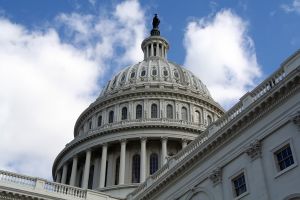The ballots are in, the speeches are over, and come January a new Congressional class will fill the House and the Senate. Some of its members, including successful Tea Party candidates, harbor hostile views of environmental legislation, but many environmental advocates are returning.
“I don’t know that the election itself makes a huge amount of difference,” says Tony Massaro, senior vice president for political affairs at the
League of Conservation Voters. “The defeat of comprehensive clean energy and climate legislation made a significant difference in what happens on the legislative front. I think that we knew that the key battle would move to keeping the administration’s ability to regulate and control global warming pollutants, and I don’t think that fundamentally changes.”
Commercials aired during the campaigns, and debates between competitors showed that cap-and-trade legislation is hugely unpopular and global warming is again a controversial topic, even though there is scientific consensus that humans are largely responsible for our warming world.
In southern Indiana, for example, Todd Young, a Tea Party supported Republican candidate for the House of Representatives, won his race against incumbent Baron Hill. At a debate between the two at the beginning of last month, Hill defended his vote for the Waxman-Markey cap-and-trade bill, saying that, “Climate change is real, and man is causing it. That is indisputable. And we have to do something about it.”
Young, on the other hand, “strongly opposes cap and trade and other unilateral measures to combat global warming,” according to an
article in
The New York Times. “He says he is uncertain what is causing the observed heating of the planet, adding that it could be caused by sunspots or the normal cycles of nature.”
He’s not the only skeptic who emerged during the build up to yesterday’s election, but there are still a number of winners like Calfornia's Barbara Boxer and Nevada's Harry Reid who are strong environmental advocates and will return after this session ends.
“It isn’t a lost cause,” said Anthony Leiserowitz, the lead author of a study on how political affiliations are associated with views on climate change, in an
article in SolveClimate News. Part of the Yale Project on Climate Change Communication, he said that prospects for Congress to pass climate change legislation “hasn’t become as polarized as gay marriage. There’s still a way forward.”
Most Americans still support legislation to control carbon emissions, polls show, but moving ahead could prove difficult if people feel that limits on the greenhouse gases responsible for global warming will negatively affect the economy.
For now, environmental advocates may have to focus on incremental improvements, like strengthening renewable energy standards and automobile efficiency, and defending the EPA’s authority to manage emissions.
“There’s still overwhelming support for the EPA to regulate greenhouse gas pollutants,” says Massaro. “We still fundamentally believe that the voters, regardless of what they said on the macro level last night, are still with us on this issue. At some point the politicians are going to do what they always do when they see where the parade is moving: run to the front of the parade so they look like leaders. At some point the public isn’t going to be way ahead of the politicians on this, but it wasn’t last night.”


